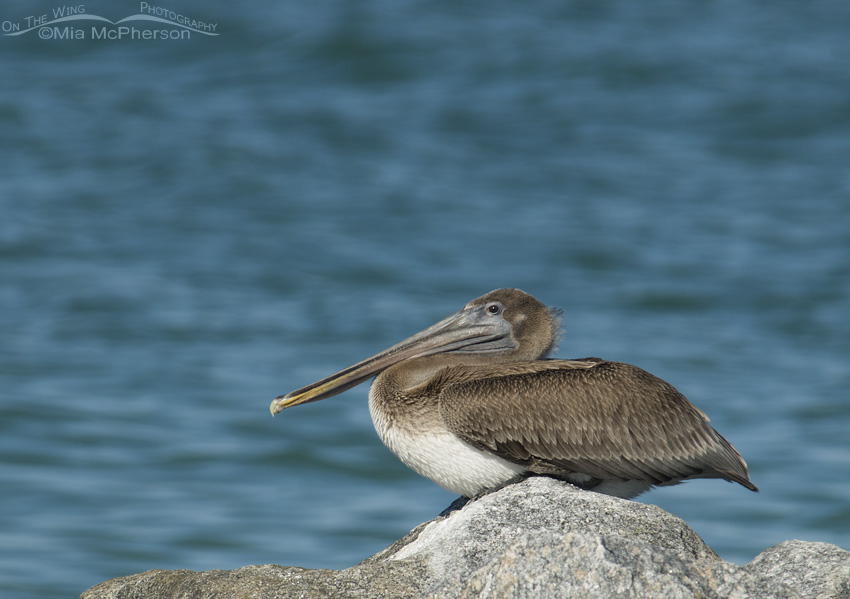 Resting juvenile Brown Pelican – Nikon D200, handheld, f6.3, 1/800, ISO 200, Nikkor 80-400mm VR at 400mm, natural light
Resting juvenile Brown Pelican – Nikon D200, handheld, f6.3, 1/800, ISO 200, Nikkor 80-400mm VR at 400mm, natural light
Please, please, find an authorized and licensed bird or wildlife rehabilitator in your area immediately. Licensed rehabilitators know how to take care of wild birds, they know their diet, how to feed them and how to take care of them so the birds can be rehabbed and released.
For several days in a row I have seen the search engine term “how much to feed a juvenile brown pelican” directed to OnTheWingPhotography via the admin screen on my WordPress based site. I don’t know or have information about how much a Brown Pelican needs to eat per day. I’m assuming you found a downed or injured young Brown Pelican and are searching for help on how to take care of it.
Thank you for finding the downed or injured bird and for caring enough to do something about it. Please be aware that it is illegal to possess migratory birds unless you are a licensed rehabber no matter how good your intentions are. (see the Migratory Bird Treaty Act)
The best course of action with downed or injured birds is to find a licensed rehabber or rescue group and take the bird there. They are skilled, qualified and know how to handle birds. They also know how to prevent imprinting.
Imprinting is a form of learning in which an animal gains its sense of species identification. Birds do not automatically know what they are when they hatch – they visually imprint on their parents during a critical period of development. After imprinting, they will identify with that species for life.1
Imprinting or being habituated to humans feeding them can cause issues that prevent birds from being released back into the wild.
Feeding Brown Pelicans the wrong food can cause them harm. For instance; feeding them dead baitfish and fish carcasses can cause holes and tears in their pouches or they might get them stuck in their throats which can cause injury, infection or death.
I have rescued birds that were injured, were entangled in fishing gear, hung up on barbed wire fences or were downed due to starvation and have gotten them transferred to or have taken them to the rehab facility myself. That is always the best course of action for downed or injured birds.
Note, this does not always apply to fledgling songbirds. For more information on them, please look here.
Again, thank you for finding the Brown Pelican, thanks for caring about its health and welfare. If you haven’t already taken the pelican to a rehabber please do so. If you use those search engine terms again today I hope this information will guide you in your search for getting help for the pelican.
A licensed rehabber will give the pelican the best chance to be wild and free again.
Life is good.
Mia
1Human-imprinting in Birds and the Importance of Surrogacy
Click here to see more of my Brown Pelican photos plus facts and information about this species.


Interesting I did not know it kept track of searches and would direct to your site when looking for feeding and care instructions. Thanks for putting info up about looking for help.
Trust the experts. Rely on the experts.
Something I would like to see a whole lot more of.
And I hope that the pelican is ok, survives, and thrives.
I sure hope the person who may have rescued the juvenile Brown Pelican gets your message. Thank you for putting it out there for people to see. Beautiful photo, by the way.